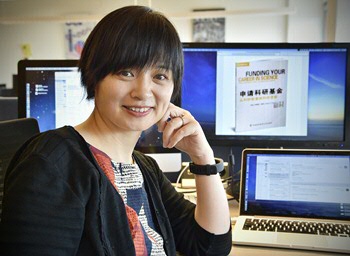Three Chinese alumni translate two Dutch books on scientific training
Thanks to the collaboration of three RUG alumni from China, two books by professor Ritsert Jansen were published by the Peking Union Medical College Press in 2017 and 2019. Naishi Li coordinated the translation into Chinese, Jingyuan Fu and Yang Li were responsible for the proofreading. Jingyuan Fu, who currently works as an adjunct professor in the field of genetics at the RUG, thoroughly enjoyed the process of getting the books published in China. “In fact, I was the first PhD student who graduated from Jansen’s group, back in 2007, while Naishi was the first PhD student to graduate under my own supervision.”

After his graduation Naishi Li returned to China to work at the top UMC Peking Union Medical College as a doctor. He kept in touch with his promotor Jingyuan Fu. “He told me a friend of his was working in the press office of the Peking Union Medical College and had asked him if he knew of any interesting books to put forward for publication. At first, we were discussing books written in our own field of research, when all of a sudden one of us said: why not one of the books by Ritsert Jansen. His books are interesting for anyone in science and research and we believe Chinese researchers could really benefit from what he has to say about the importance of scientific training.”
These books are called Developing a Talent for Science and Funding Your Career in Science and were first published by the Cambridge University Press. Fu: “Building your career in science is very hard, since the scientific world is so very competitive. This is true for scientists both in the Netherlands and China. So, these books about how to develop a talent for science, how to get funding, how to move to the next stage in your career, how to support your research and so on are very helpful. We were sure this would also be true for scientists starting out in China.”
Coordinated by Naishi Li, a number of translators, including Naishi himself, set out to translate the books into Chinese. Jingyuan Fu and Yang Li took on the job of proofreading. The latter had already transferred to the Radboud University, where she is working as an associate professor. Fu: “I was responsible for the first book, Yang Li for the second one. It was our job to make sure the translations were correct. We also found out that some terms could not be translated into Chinese literally. For instance, we had quite some discussion about the term ‘grant parent’, which Ritsert uses to indicate a kind of mentor who supervises the process of applying for a research grant. This was a very hard term to translate, since the exact equivalent does not exist in China.”
Another difficulty was the difference between grant opportunities. Fu: “Over here, young researchers can apply for personal grants, like the veni, vidi and vici. But we don’t have those grants in China. In general, it is a lot harder to fund your career in China, especially if you have no international experience. One of the reasons we wanted to translate these books is because we think Chinese scientists can benefit from what Ritsert has written about how to build your scientific career. We added an extra preface to explain the Dutch situation and the differences between the grant systems.”
Naishi Li presented the books during a number of reading sessions in China. The most important session was held in the auditorium of Peking Union Medical College. He shared his story about working in Groningen with the audience and explained why he believes that books about scientific training are so important for Chinese scientific researchers. He also got to sign his name in the books that were sold that day. The books are highly recommended by the professors at the Peking Union Medical College and the first one was awarded the Chinese 2018 Good Book in Medicine prize.
